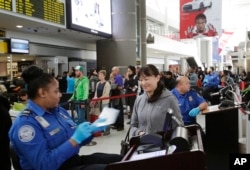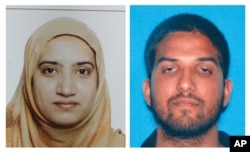Two mass killings, one in Paris and the other in California, have focused U.S. leaders' attention on two methods by which people are allowed into the country, as they look for ways to prevent a future attack.
One target for reform is the K-1 visa used by Tashfeen Malik and more than 25,000 people a year who are engaged to U.S. citizens to move to the country. Malik died in a shootout with police Wednesday after she and her husband killed 14 people hours earlier at a holiday party.
The other, the visa waiver program, affects a pool of people that is orders of magnitude larger. It allows people from one of 38 different countries to travel to the United States for tourism or business. They can stay up to 90 days.
"We should put in place stronger screening for those who come into America without a visa so that we can take a hard look at whether they've traveled to war zones," President Barack Obama said in an address on terrorism Sunday. "And we're working with members of both parties in Congress to do exactly that."
In 2013, the latest year of comprehensive federal data, 21.2 million people entered the U.S. under the visa waiver program, accounting for about 39 percent of all people who came for a vacation or business trip.
Congress to vote
The House of Representatives will vote this week on a bill to tighten the program. The measure would bar citizens or nationals of the waiver countries from coming to the U.S. without a visa if, in the past five years, they have been to Iraq, Syria or any other designated "country or area of concern."
Any of the waiver countries could be suspended from participating if they fail to cooperate with the U.S. in sharing information about whether travelers represent a security threat.
Obama also said Sunday he has ordered the departments of State and Homeland Security to review K-1 visa regulations. A K-1, or fiancé, visa is easier to obtain than others, raising questions about the process and how potentially porous it is.
Malik grew up in Pakistan but later moved to Saudi Arabia, where she first met Syed Farook in person. The two had previously corresponded through an online dating service, according to Farook family attorney Mohammad Abuershaid.
Ease of entry
That one meeting was all it took for the pair to qualify as an engaged couple for the K-1: one meeting within two years of the visa application. Farook would have collected evidence of that meeting and filed a petition requesting a K-1 with the U.S. Immigration Service, the beginning of a process that generally takes six to 12 months and includes medical, background and income checks.
David North with the Center for Immigration Studies, a Washington-based research organization that leans toward restricting immigration, wrote last week that applicants for K-1 visas are seldom denied entry to the U.S. Last year, 304 of the visas were granted for every one denied, he said.
With Malik's case fresh in the minds of lawmakers looking to add restrictions, North said this is the first time someone admitted to the U.S. on that type of visa has ever been accused of murder.
"To the best of my knowledge, we have had aliens from the Middle East killing people in the United States, or trying to do so, on tourist, student and immigrant visas, but this is the first one to be in the K-1 class," said North.
The shooting "certainly means that someone has to consider it and think about it," said Thomas Sanderson, the director of transnational threats at the Washington-based Center for Strategic and International Studies about tightening the K-1 process. "It’s a tough question similar to the visa waiver program, which I personally think is the much bigger security threat here."
Questions about the fiancé visa program come as a heated debated continues in the U.S. about the Obama administration’s plan to resettle Syrian refugees. Some critics argue the refugees pose a greater security risk because terrorists may use the resettlement program to enter the country.
White House spokesman Josh Earnest pointed out Friday that the vetting program for Syrians requires “the most rigorous, intensive screening of anyone who attempts to enter the United States," while the screening standards for the fiancé visa "are not as strict."
Editor's note: An earlier version of this story misattributed a quote by Thomas Sanderson to another individual. We regret the error.












